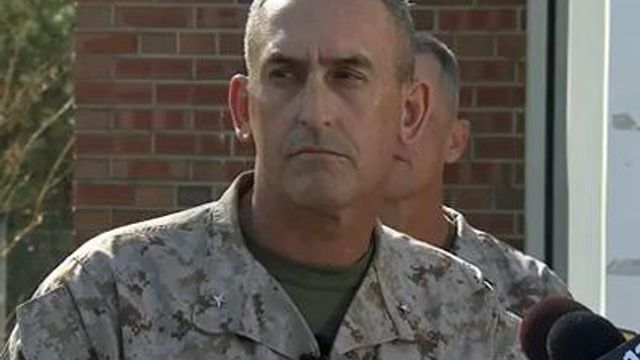Mortar explosion in firing tube kills Camp Lejeune Marines in Nev.
A mortar shell explosion killed at least seven Marines from Camp Lejeune and injured several more during mountain warfare training in Nevada's high desert, prompting the Pentagon to immediately halt the use of the weapons until an investigation can determine their safety, officials said Tuesday.
Posted — UpdatedThe explosion occurred Monday night at the Hawthorne Army Depot, a sprawling facility used by troops heading overseas, during an exercise involving the 2nd Marine Expeditionary Force from Camp Lejeune, N.C. Several Marines from the unit were injured in the blast, authorities said.
The 60mm mortar round exploded in its firing tube during the exercise, Brig. Gen. Jim Lukeman said at a news conference at Camp Lejeune. He said investigators were trying to determine the cause of the malfunction.
The 60mm mortar is a weapon that traditionally requires three to four Marines to operate, but it's common during training for others to observe nearby.
An explosion at the point of firing in a training exercise could kill or maim anyone inside or nearby the protective mortar pit and could concussively detonate any mortars stored nearby in a phenomenon known as "sympathetic detonation."
Renown Regional Medical Center in Reno, the area's major trauma hospital, took several patients, including two Marines and a sailor who were listed in very serious condition Tuesday, three Marines in serious condition and another Marine who suffered minor injuries, Lukeman said.
The identities of those killed won't be released until 24 hours after their families are notified.
"We appreciate your support as we mourn the loss of these brave Marines who gave their lives to defend the nation. We remember their courage and sacrifice," Lukeman said. "Our thoughts are with the families as we grieve for those we've lost and pray for the recovery of those who were injured."
Lukeman would not say what unit the victims were with but said they had been at Hawthorne for about a month as part of the military's training to maintain a force of readiness. They were not linked to any specific deployment, he said.
He could not say whether the victims were in the same firing pit, standing nearby for training observation or in an adjoining mortar pit, but any of those situations would have been them in danger after such an explosion.
North Carolina and Nevada political leaders expressed their sympathy.
"I was so saddened to learn about the seven Marines from Camp Lejeune who were killed last night in Nevada," U.S. Sen. Kay Hagan, D-N.C., said in a statement. "My thoughts and prayers are with the families of the Marines who were killed and those who were injured, and I will continue to monitor the investigation so we can find out what happened and take appropriate steps."
Nevada Republican Sen. Dean Heller tweeted, "Thoughts and prayers are with the families who lost a loved one in the Hawthorne Army Depot explosion. Grateful for their service."
• Credits
Copyright 2024 by WRAL.com and the Associated Press. All rights reserved. This material may not be published, broadcast, rewritten or redistributed.





